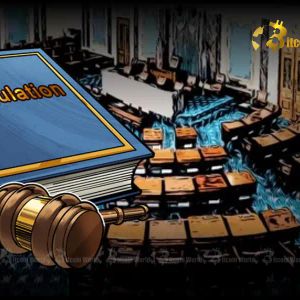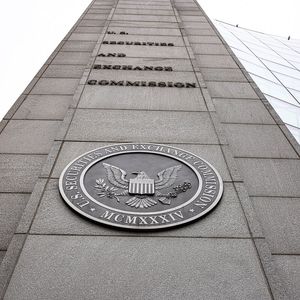US House Speaker Signals Pivotal Crypto Legislation Push
6 min read
BitcoinWorld US House Speaker Signals Pivotal Crypto Legislation Push In a significant development that could reshape the future of digital finance in America, U.S. House Speaker Mike Johnson has confirmed that Republicans have agreed to support the advancement of crypto legislation . This announcement, coming from the highest echelons of the U.S. House of Representatives, signals a potentially pivotal moment for the cryptocurrency industry, indicating a growing willingness within a major political party to bring regulatory clarity to the volatile yet innovative world of digital assets. The Pivotal Shift in US Crypto Legislation The Speaker’s statement, reported by JinSe Finance citing Jin10.com, suggests a concerted effort to move forward with a regulatory framework that many in the crypto community have long awaited. For years, the lack of clear, comprehensive crypto legislation in the United States has been a significant hurdle for innovation, investment, and mainstream adoption. Businesses have struggled with regulatory uncertainty, often operating in a gray area that hinders growth and pushes talent overseas. This latest declaration from the US House Speaker could mark a turning point, providing the necessary political momentum to address these challenges. What does this mean for the current landscape? Historically, legislative efforts around cryptocurrencies have been fragmented, often debated across various committees with differing views on how to classify and regulate digital assets. From stablecoins to NFTs, and from decentralized finance (DeFi) to central bank digital currencies (CBDCs), the scope of potential legislation is vast. This agreement among Republicans indicates a unified front to tackle these complex issues, aiming to provide a clearer path for the industry to thrive while also protecting consumers and maintaining financial stability. Understanding the US House Speaker’s Stance When the US House Speaker , Mike Johnson, makes such a statement, it carries substantial weight. As the leader of the House, his endorsement is crucial for prioritizing bills, allocating resources, and rallying party members to support specific legislative initiatives. His commitment suggests that cryptocurrency regulation is no longer a fringe issue but a mainstream policy concern that demands attention and action. Why is Speaker Johnson’s backing so important? His position allows him to: Set the Agenda: Influence which bills come to the floor for a vote. Unify the Party: Encourage members to vote along party lines, or at least to engage constructively. Signal Intent: Send a clear message to the industry, investors, and international partners about the U.S.’s regulatory direction. While the exact nature of the legislation remains to be fully detailed, it is widely anticipated to cover key areas such as market structure, consumer protection, and the classification of various digital assets. This move could pave the way for the U.S. to solidify its position as a leader in the global digital economy, fostering an environment where innovation can flourish responsibly. Decoding Republican Support and Internal Dynamics The announcement of Republican support for advancing crypto legislation is a significant political development. Generally, many Republicans advocate for policies that promote innovation, reduce regulatory burdens, and foster economic competitiveness, principles that often align with the decentralized and entrepreneurial spirit of the crypto industry. They tend to view digital assets as a new frontier for American ingenuity and a tool for individual financial freedom, rather than primarily as a source of illicit activity or systemic risk. However, the path to consensus is rarely smooth. Eleanor Terrett, host of Crypto in America, earlier reported on X that nine Republican lawmakers voted against a crypto bill, with three others not yet casting their votes. This highlights that while there’s a general agreement to push legislation, internal disagreements exist, likely concerning the specifics of any proposed bill. These dissenting votes could stem from various factors: Specific Bill Details: Disagreements over particular clauses, definitions, or regulatory agencies’ roles. Ideological Differences: Some lawmakers might hold more conservative views on financial innovation or have concerns about potential risks associated with digital assets. Constituent Concerns: Representing districts with varying perspectives on crypto’s benefits and risks. Regulatory Approach: Debate over whether to adopt a light-touch approach or a more stringent regulatory framework. Overcoming these internal divisions will be key to ensuring any proposed legislation has enough bipartisan backing to pass both the House and the Senate. The Speaker’s commitment, however, suggests a strong push to reconcile these differences and present a unified front. What This Means for Digital Assets in America The potential for comprehensive digital assets legislation carries profound implications for the entire crypto ecosystem in the United States. For businesses, regulatory clarity means the ability to plan, invest, and innovate with greater certainty. Currently, many crypto companies face a patchwork of state-level regulations and conflicting guidance from federal agencies, making compliance complex and costly. A unified federal framework could: Foster Innovation: Encourage new companies to build and operate within the U.S., retaining domestic talent and capital. Attract Investment: Provide institutional investors with the confidence needed to deploy significant capital into the crypto space. Enhance Consumer Protection: Establish clear rules of the road for exchanges, custodians, and other service providers, reducing risks for everyday users. Improve Market Integrity: Combat illicit finance and market manipulation through clear oversight mechanisms. For individual investors, clear rules around digital assets could lead to more secure platforms, better-understood investment products, and a reduction in scams and fraudulent activities. It could also clarify tax obligations and provide a more stable environment for long-term participation in the crypto market. The U.S. has been lagging behind other major economies, such as the European Union with its MiCA (Markets in Crypto-Assets) regulation, in establishing a comprehensive framework. This renewed push could help the U.S. regain its competitive edge and ensure it remains a hub for financial innovation. Charting the Future of US Blockchain Policy The commitment from the US House Speaker to advance blockchain policy signals a recognition of the underlying technology’s transformative potential beyond just cryptocurrencies. Blockchain, as a distributed ledger technology, has applications across various sectors, including supply chain management, healthcare, voting systems, and identity verification. Comprehensive legislation could therefore extend beyond just the financial aspects of crypto to foster broader blockchain adoption and research. What are the next steps in this legislative journey? Typically, a bill would go through: Committee Review: Where experts and stakeholders provide testimony, and the bill is debated and amended. House Vote: If it passes committee, it moves to a full House vote. Senate Review: If passed by the House, it moves to the Senate, where it undergoes a similar process. Presidential Assent: Finally, if passed by both chambers, it goes to the President for signature into law. The road ahead will undoubtedly involve intense debate, negotiations, and potential compromises. However, the explicit Republican support from the Speaker’s office provides a strong foundation. This proactive approach to blockchain policy is crucial for ensuring the U.S. remains at the forefront of technological advancement and global competitiveness. It represents a shift from reactive enforcement to proactive regulation, a move welcomed by many industry participants. The announcement from U.S. House Speaker Mike Johnson marks a significant moment for the future of crypto legislation in the United States. With explicit Republican support , the stage is set for potential breakthroughs in establishing a clearer regulatory framework for digital assets and advancing robust blockchain policy . While challenges and internal divisions persist, the commitment from the US House Speaker signals a powerful shift towards embracing and integrating this innovative technology into the mainstream financial system. The journey ahead will require continued collaboration and thoughtful debate, but the path towards a more regulated and secure crypto landscape in America appears to be gaining unprecedented momentum. To learn more about the latest crypto market trends, explore our article on key developments shaping digital assets and their institutional adoption. This post US House Speaker Signals Pivotal Crypto Legislation Push first appeared on BitcoinWorld and is written by Editorial Team

Source: Bitcoin World



